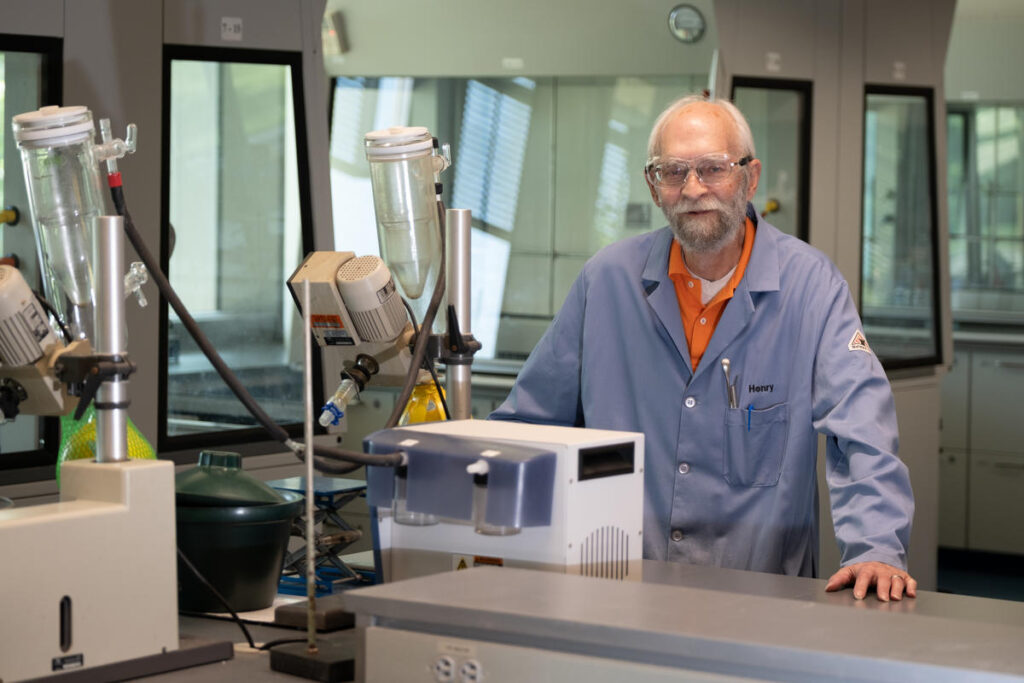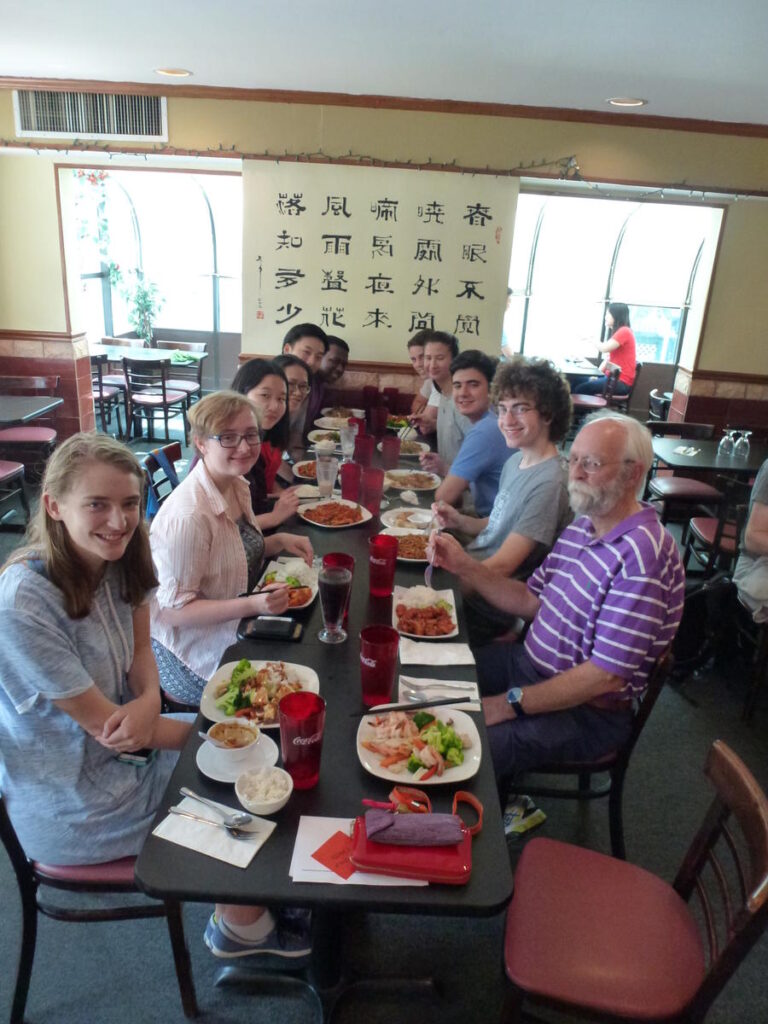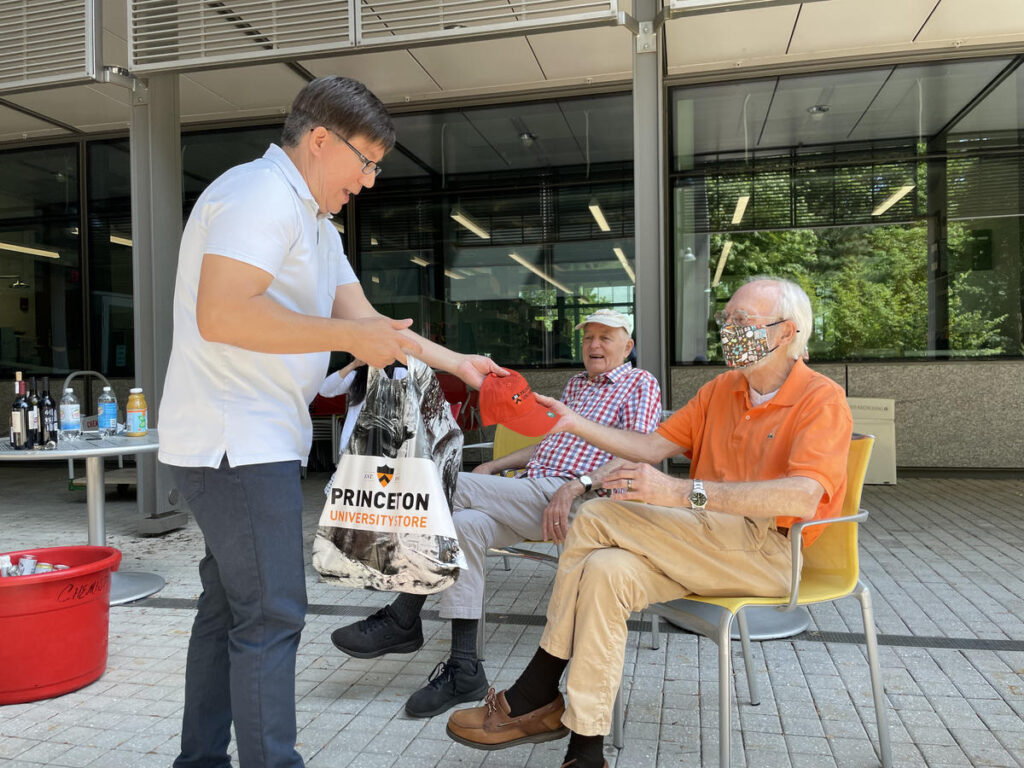Henry Gingrich: ‘A Very Good Time’

Henry Gingrich, the director of the Organic Chemistry Teaching Laboratories and lecturer in chemistry who shared his knowledge of chemical behavior with generations of students, will step down from his role this month after serving the Department of Chemistry for 33 years.
Beginning with his appointment as an instructor in the labs in 1988, Gingrich was a steadfast and dedicated teacher, adored by his students as much for his curmudgeonly aspect as his knowledge and experience while training graduate preceptors and shepherding over 200 students through the organic labs each year.
“I really enjoy getting to know the students on an individual basis,” said Gingrich. “If you do the lecture, you might get to know one or two students. But when you’re in the lab, you have your 45 students and you can circulate around and talk to them – sometimes about chemistry, sometimes about other things.
“I get to know three types of students best: those who are constantly having issues: ‘Oh, I dropped my test tube on the floor, can I come back another day?’ or those who occasionally will impress you with their handling of the equipment in the lab or their questions. And then everybody in between.”
Together with his predecessor, Miles Pickering, Gingrich wrote the Department’s in-house laboratory manual, The Organic Puzzle Book, containing the experiments run at Frick. This was one of his most anticipated tasks during the summers: going through the manual, tweaking some experiments and adding new ones. Or, as he put it, “playing in the lab with minimal distraction.”
He is also the co-author of Study Guide/Solutions Manual for Jones and Fleming’s Organic Chemistry.
Gingrich ran the Department’s Charles H. Leach II Summer Scholars program, a Summer Undergraduate Research Program (SURP), for some 30 years, inviting talented potential chemistry concentrators to do extra research and hands-on investigations. He also served as the Department’s Advanced Placement Officer, answering questions about how scores on AP subject tests can impact undergraduate course requirements.
In addition, Gingrich was the Junior Colloquium Chairman. “What does that mean?” Gingrich said. “Well, every Monday night in the fall semester the juniors get together and we would bring in two faculty members who would talk about the research, so they would have some idea who they might want to do research for in the spring semester.”
Erik Sorensen, the Arthur Allan Patchett Professor in Organic Chemistry, and professor of chemistry, worked with Gingrich in CHM 304, Organic Chemistry II: Foundations of Chemical Reactivity and Synthesis, beginning in 2009. Sorensen reported that Gingrich attended every single course lecture – “He never missed one!” – often sitting right up in front so he could easily add to the discourse.
“Henry’s enthusiasm for organic chemical reactivity – its roots and its applications – is both impressive and rare,” said Sorensen. “Gaining recognition for one’s teaching at a place that has so many excellent teachers and scholars is not easy, but Henry Gingrich deserves such recognition. His dedication to learning and the undergraduate experience in organic chemistry at Princeton has been exceptional.
“For me,” Sorensen added, “Henry has always been a most valuable consultant as I built the lectures for the courses. On so many occasions, I would phone Henry a few hours before ‘show time’ and we would discuss how to best approach the teaching of a chemical concept or introduce an instructive chemical problem that would deepen our students’ understanding. Henry and I had so many conversations about that stuff! I will miss those phone chats about teaching and his presence in my lectures very much.”

Gingrich and students celebrated the end of their nine-week 2018 Leach Summer Scholars program with a luncheon in Princeton.
Director of Undergraduate Studies Rob L’Esperance, who has also worked with Gingrich for years, had this to say about him: “Henry is a dedicated professional and worked at providing the students with the best possible lab experience. Over his 30 years, he has built quite an array of experiments to develop not only the students’ technical skills but also to develop their analytical thinking.
“Henry is also an excellent colleague. When I started, he was very helpful getting me up to speed and was a great resource to bounce ideas off of. Henry’s insights from all his years of experience proved vital for moving the undergraduate program forward.”
Nicholas Falcone, a rising third-year graduate student in the Sorensen Lab, said Gingrich was especially helpful during this year’s challenging virtual semester.
“Among the qualities that make Henry a fantastic mentor, his attention to detail stands out more than anything. That is something I hope to emulate if I ever get the chance to teach my own course,” said Falcone. “Some people think about the ‘big picture,’ while others concern themselves with the minutiae. But Henry does both at a very high level. It’s been a pleasure to learn from Henry in his final year at Princeton Chemistry.”
Gingrich received his B.S. in chemistry from Elizabethtown College, and his Ph.D. in organic chemistry from the University of Florida. He did his postdoctoral work at the State University of New York, Buffalo. His fi
rst job was as a research chemist in insecticide discovery with the agricultural chemical group of FMC Corporation here in Princeton.
His research interests have been in o-Carboranes, Diels-Alder reactions with inverse electron demand, 1,3-dipolar cycloaddition reactions, heterocyclic chemistry, organic synthesis, and the design of undergraduate organic chemistry experiments.

Erik Sorensen hands some Department of Chemistry swag to Gingrich at his recent retirement gathering.
GINGRICH IS HIS OWN WORDS
Below are some of the most memorable lines from a recent interview with Gingrich.
On his students:
“There’s a balance between social life and academics, and that’s the biggest thing that leads to success or failure at the University.”
“What we’re constantly looking out for is somebody who knows their way around the lab, but also is academically good. Those are the people we’d like to get as chemistry majors. But damn, they often go across the street to Mol Bio, instead.”
“What I do like is every year, I try to pick out maybe half a dozen students and ask them to apply to the summer program. There’s a difference between doing canned laboratories, which we’ve designed to work but don’t always, and actually getting that first taste of research.”
“Instead of saying to students, you’re going into the lab to make compound X this week and how pure it is, neither the students nor the TAs will know what the outcome of an experiment is supposed to be. The student’s job is to run the experiment, collect the data, and analyze the data when they write their lab report. It doesn’t always work that simply, but that’s sort of the lab philosophy.”
On life at Frick:
“I met Paul (Reider) years ago, before he came to Princeton, at the Gordon Research Conference. And I would tell him a joke and then he wouldn’t get it. And then half an hour later, all of the sudden he’d start laughing.”
“Each fall, the day or two before classes start, they have an Academic Expo and they bring everybody and their uncle into Frick. When that happens, my best advice is for you to leave the building for the day.”
“I’ll get my TAs in a half hour before their first lab session of the week and we’ll go over new techniques, possible pitfalls, and then they’ll talk to their students. A good TA will circulate around the lab and point out potentially bad things and talk to the students individually.”
“I’ve worked with three really good, dedicated professors over the years. I worked with Mait Jones. And Marty Semmelhack. And now with Erik Sorensen. My wife says Erik has the best penmanship she’s ever seen.”
On retirement:
“I haven’t figured out what in hell I’m going to do with myself when I actually retire in the end of June. According to my resume, I’m into 50s rock and roll music, I collect stamps, I like to read fiction and sci-fi – none of which I have gotten to lately. So, I guess that some of my time will be occupied introducing those to myself again.”
“I have to be honest with you, I’ve had a very good time for 30 years.”
